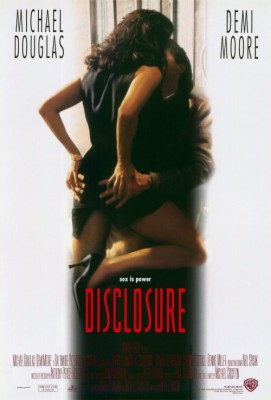| Reviews & Columns |
|
Reviews DVD TV on DVD Blu-ray 4K UHD International DVDs In Theaters Reviews by Studio Video Games Features Collector Series DVDs Easter Egg Database Interviews DVD Talk Radio Feature Articles Columns Anime Talk DVD Savant Horror DVDs The M.O.D. Squad Art House HD Talk Silent DVD
|
DVD Talk Forum |
|
|
| Resources |
|
DVD Price Search Customer Service #'s RCE Info Links |
|
Columns
|
|
|
Disclosure
Warner's Blu-ray is adequate, no better. Filmed in Panavision, Disclosure is one of those 'scope films shot with a fairly shallow depth-of-field throughout, so those expecting VistaVision/70mm-type clarity will be disappointed. The only extra is a trailer, and even that is standard-def as well as and panned-and-scanned.
Tom Sanders (Douglas) is the head of manufacturing at DigiCom, a Seattle-based, Microsoft-type software company. A $100 million merger is in the works, and Tom is optimistic that founder-president Bob Garvin (Donald Sutherland) will soon be appointing him vice president in charge of production. Instead, Garvin hires an outsider, Meredith Johnson (Demi Moore), an old flame of the married-with-kids Tom.
That evening, Meredith calls the discouraged Tom into her office for an after-hours meeting, where she unsubtly tries to seduce him. He initially resists but weakens not long before she performs fellatio. Then, about to irreversibly commit, Tom sees a reflection of himself (a very overused device in this film), is overcome with guilt, and bolts. Furious, Meredith vows to ruin him.
Sure enough, the next morning she's claiming he sexually assaulted her. Because of the impending merger and her new position, both she and the company want to keep it quiet, and Tom is offered a "lateral transfer" to Austin, Texas. He refuses, and with nationally famous attorney Catherine Alvarez (Roma Maffia) explores the possibility of filing sexual harassment charges against Meredith and DigiCom.
Disclosure was not exactly embraced by feminists, though complaints of misogyny are largely without merit. The movie isn't really about that tiny minority of criminal allegations by workingmen against female bosses anyway. Rather, by turning the usual sexual harassment situation on its head, the audience is confronted with some interesting questions. If sexual harassment, for instance, isn't about sex but power, why should Tom be any less sympathetic than a woman harassed by a male boss? Why would some regard it "sexy" for a woman to assault a man in that way when the same thing reversed is grotesque, unpardonable, and even criminal?
While Moore's Meredith is thoroughly despicable throughout, and Moore herself does a fine job in her role, the film clearly if obviously tries to offset her ruthless character with others: Maffia's smart, assertive attorney; Tom's wife (British actress Caroline Goodall using a convincingly American accent) who is outraged that her husband let things get as far as they did but reasonably backs him during the crisis; and Tom's secretary (Jacqueline Kim), who generally supports her boss but also resents Tom's nonsexual but still inappropriate touching. (He slaps her on the butt early in the film, a gesture one might have thought went out with the 1950s.)
Tom's reaction to Meredith's behavior, and his attempts to responsibly resolve it despite disbelief from various friends and colleagues is consistently interesting, and the deposition scenes have an authentic, intriguing air.
Where the picture founders is in the harassment scene itself. Clearly the movie was sold as Hot Stuff (note the poster above), promising steamy footage of Douglas and Moore, then near the peak of their stardom. The problem, of course, is that the scene is supposed to depict unconscionable sexual harassment but, simultaneously, generate sparks for box office purposes and titillate the audience.
The results are thoroughly unreal, even laughable, and generally the sequence resembles soft-core one expects to find on The Playboy Channel. In wanting to be hot it only looks ridiculous and not at all believable. During the sequence I found myself wondering how much more authentic it could have played in the hands of, say, an Alexander Payne (think Matthew Broderick's scenes with Delaney Driscoll in Election). (Though as reader Sergei Hasenecz points out, "Certainly would be more authentic, but the scene in Election isn't hot either, which was definitely what the producers wanted for Disclosure.")
Another problem is the climax, which absurdly has Tom breaking into a hotel suite to access an experimental virtual reality program, depicted via special effects by Industrial Light & Magic. Crichton's novels often believably incorporate technology several years or decades ahead of their practical and mainstream use, but in Disclosure the idea of unlocking clues in a virtual reality universe adds only an unnecessary distraction from the story's main themes, and in the movie at least attempts to visualize this are fairly disastrous and cheesy, especially with 2012 hindsight.
One final complaint is the film's production design. Like most everything else, it's extravagantly overdone, with DigiCom's offices more or less built as one colossal set, a maze of brick, glass, and wrought iron resembling something by M.C. Escher. Conversely, Ennio Morricone's score is extremely subtle, intriguingly building steam very, very gradually.
Video & Audio
Filmed in Panavision and originally released theatrically with Dolby SR audio, Disclosure looks and sounds reasonably good, with decent color and clarity given the deliberate softness of many individual shots. Audio here is DTS-HD Master Audio 5.1, with a 5.1 Dolby Digital track in (Parisian) French and a 2.0 French-Canadian track dubbed in Quebec and, likewise, tracks in Castilian (5.1) and Latin (2.0). My Japanese PlayStation3 defaulted to hidden Japanese audio and subtitle options.
Extra Features
The lone supplement is a standard-def trailer, and it isn't even letterboxed, but rather panned-and-scanned.
Parting Thoughts
Despite its many problems, Disclosure has enough in its favor to recommend watching it once, but those curious are best off Renting It.
Stuart Galbraith IV is a Kyoto-based film historian whose work includes film history books, DVD and Blu-ray audio commentaries and special features. Visit Stuart's Cine Blogarama here.
|
| Popular Reviews |
| Sponsored Links |
|
|
| Sponsored Links |
|
|
| Release List | Reviews | Shop | Newsletter | Forum | DVD Giveaways | Blu-Ray | Advertise |
|
Copyright 2024 DVDTalk.com All Rights Reserved. Legal Info, Privacy Policy, Terms of Use,
Manage Preferences,
Your Privacy Choices | |||||||















